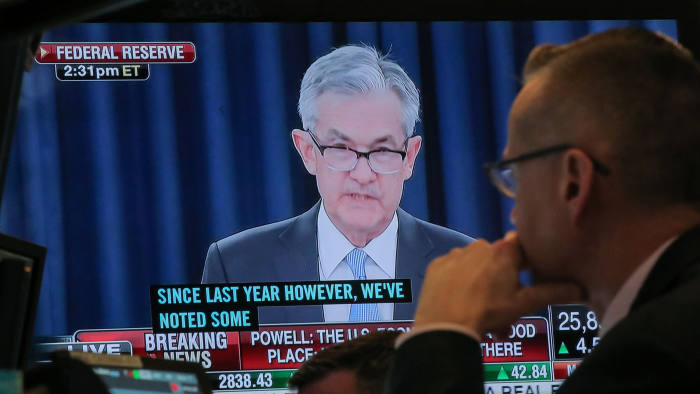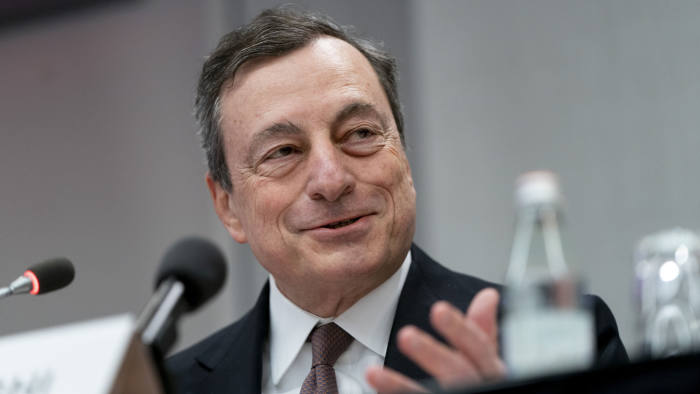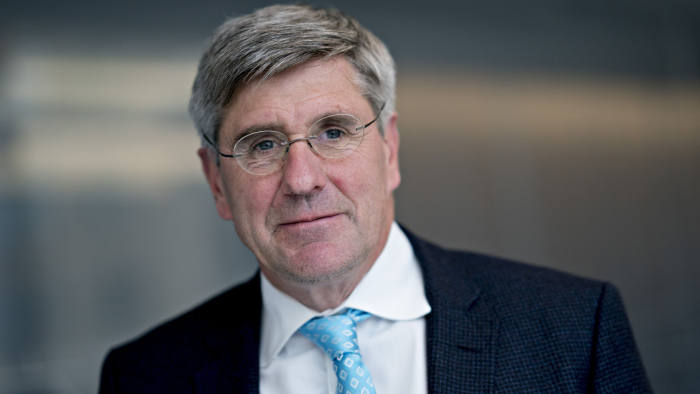Economists warn central bank independence is under assault around the world
Sam Fleming and Chris Giles in Washington

Fed chair Jay Powell has come under pressure from President Donald Trump to lower rates © Reuters
Donald Trump’s attempts to influence the US Federal Reserve have triggered anxiety among policymakers gathered for meetings in Washington, as economists fret that the apparent absence of an inflationary threat is making it easier for politicians to push for looser monetary policy.
Officials at the spring meetings of the International Monetary Fund and World Bank defended the Fed following Mr Trump’s attempts to appoint two political allies to its board, and demands that it lower rates and restart quantitative easing.
The Fed is not alone in facing a threat to its independence: the Turkish and Indian central banks have also been pressured to loosen policy in recent months.
“I am certainly worried about central bank independence in other countries, especially in the [US], the most important jurisdiction in the world,” said Mario Draghi, president of the European Central Bank. With 19 governments, the ECB had an advantage because any advice from different governments was generally contradictory, he said. But he stressed that independence was crucial for the credibility of the decisions central banks take to regulate the economy.
“Populism on the left and the right is also encroaching on central banks,” said Tharman Shanmugaratnam, deputy prime minister of Singapore and chairman of its central bank. The political pressure, “does pose a very real risk of central banks being encouraged, urged and forced into new and much larger quasi-fiscal roles”.

Mario Draghi, president of the European Central Bank, has expressed concern about political interference, particularly in the US © Bloomberg
Economists fear that given sluggish growth rates and an absence of inflation, central banks are likely to face increasing political demands for looser policy. In a lecture last week, Kenneth Rogoff, the Harvard economist, warned that central bankers have traditionally been able to warn that if they are not independent, “the devil will break loose and there’ll be high inflation”. Yet that threat no longer felt urgent given low price growth around the world, which could diminish the perceived need for independence.
The independence of major central banks seemed assured after they tamed the scourge of inflation and helped lead efforts to fight and mitigate the financial crisis a decade ago. As government budget deficits exploded and fears of a debt crisis grew earlier this decade, central bankers became the only game in town for delivering economic stimulus and quelling market panic.
This was best epitomised by Mr Draghi’s 2012 comment that he would do “whatever it takes” to solve the eurozone crisis, a comment, which at a stroke, marked the moment its intensity began to fade.
That high watermark is now long gone and the discussion today is about the assault central bankers are facing. In a lecture on central bank independence, Mr Rogoff, a former IMF chief economist, argued that some central banks had been too “rigid” in sticking to inflation targets when more flexibility was required, and in taking credit for the good times even when this was not justified.
He set out a number of further reasons for the challenge facing central bankers — including a lack of inflation, an absence of tools to boost economies when interest rates are zero, and a lack of fiscal policy expertise in central banks, which limits their ability to advise governments on stabilisation when monetary policy is out of ammunition.
Now, the attitude, “Thank you very much independent central banks, you did a great job, we really appreciated it, we don’t need you any more” was taking hold, Mr Rogoff said. While this view was gaining strength, it was almost certainly wrong because inflation would come back at some point, he added. “Completely undermining the independence of central banks, those countries that do that, including the US, will live to regret it,” he said.
Amid the concern expressed at the IMF spring meetings, there were some more sanguine voices. Axel Weber, the former Bundesbank president, stressed that attempted political interference was nothing new. He pointed to unsuccessful attempts by former German chancellor Konrad Adenauer to pressure the central bank in the 1950s, and more recently from former French president Nicolas Sarkozy when Mr Weber was on the ECB governing council. “My answer was ‘who cares what Mr Sarkozy thinks?’”, Mr Weber recalled.

Donald Trump has drawn fire for saying he will nominate Stephen Moore, a long-time supporter of the president, for a seat on the Federal Reserve Board © Bloomberg
“The credibility and the sovereignty and the independence of the Fed is under no threat whatsoever. The Fed knows what to do,” said Mr Weber, who is now chairman of UBS, on Friday. “We just need to be aware that we need to stay our course despite calls from politics to do something else.”
The Fed, currently chaired by Jay Powell, has itself faced down political lobbying in the past. In an interview with Paul Volcker posted as part of an oral history project by the Fed, the former chairman recalled being summoned in 1984 into the White House library to a meeting with Ronald Reagan and his then-chief of staff James Baker. “The president wants to give you an order”, Mr Baker told him: ensure rates did not go up before the election. Mr Volcker said he gave the men no response. “It was not jovial, but President Reagan’s silence seemed to reflect some discomfort,” he recalled in the interview, which was conducted in 2008 but posted on the Fed’s site on Friday.
Some politicians acknowledged the strain that politics is now imposing on central bankers. Philip Hammond, the UK chancellor, said the political firestorm around Brexit was making it harder for the UK to attract central banking talent as it seeks a successor to Mark Carney at the Bank of England. “There may be some candidates who might be deterred from application because of the political debate around Brexit, which the governor of the BoE cannot avoid being part of,” he said.
Christine Lagarde, IMF managing director, stressed that central banks still had great power in the global economy. They were “bright spots” in the global landscape, she argued, praising their willingness to perform a U-turn and become more dovish as the slowdown took hold last year, which had an “almost instantaneous” impact.
0 comments:
Publicar un comentario